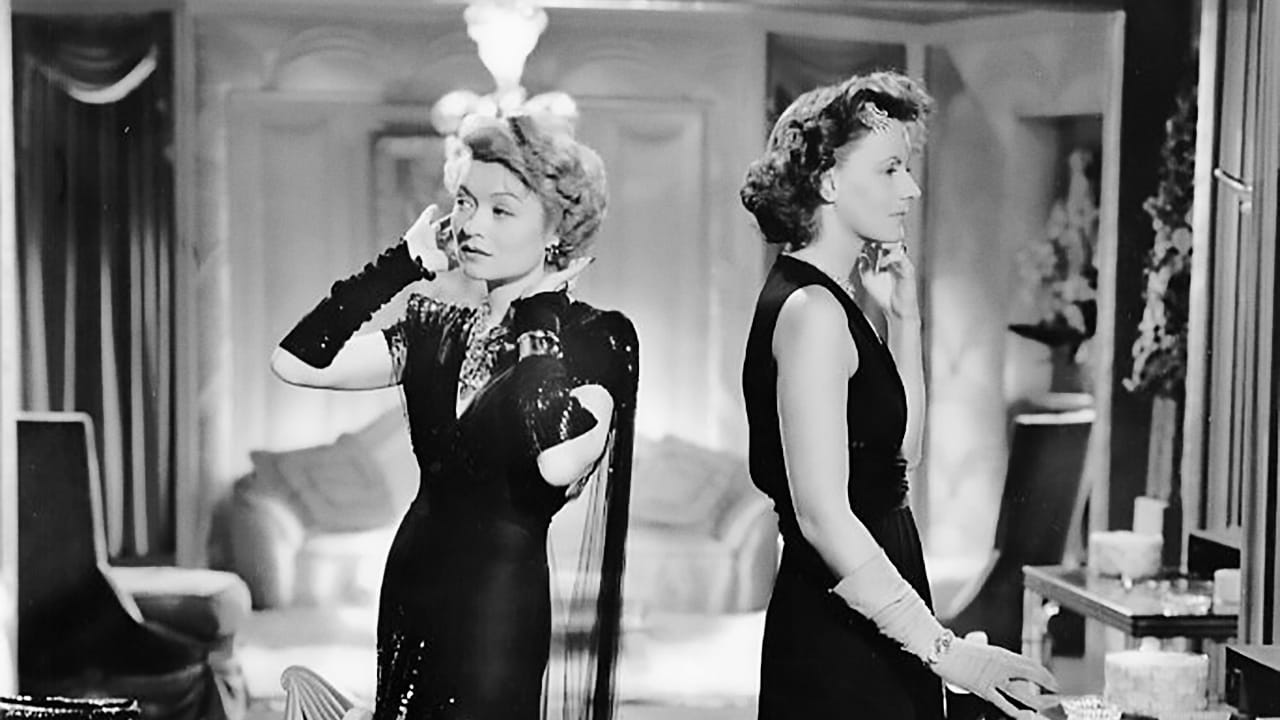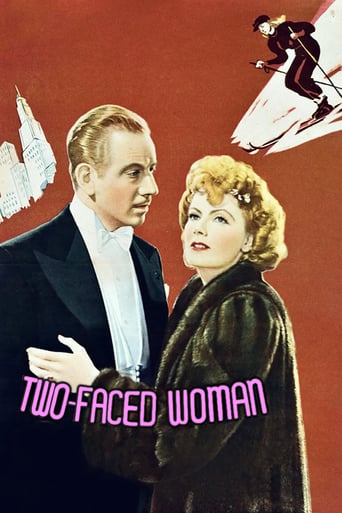jarrodmcdonald-1
Garbo deserved a better script, and her fans deserved a better Garbo send off. So what exactly is the problem with this film?For starters, the premise would have worked better for someone like Lucille Ball. As screwball comedies go, this one is especially absurd, though humorous in spots-- about mistaken identities involving a case of dual role-itis. Certainly not something that should have been attempted with Garbo, who is out of her element here. The supporting cast is well chosen, notably Constance Bennett. The picture has the usual high-gloss MGM production values. But overall, it is a mediocre script that seems more like a typical studio programmer that has been over valued and oversold because of its star. Again, it's funny in spots, and it's worth watching. But it most definitely is not a befitting motion picture swan song for a legend.
lugonian
TWO-FACED WOMAN (Metro-Goldwyn-Mayer, 1941), directed by George Cukor, stars Greta Garbo in her second American comedy that was to become her final motion picture screen appearance. Working opposite again with Melvyn Douglas, her co-star in the now classic comedy, NINOTCHKA (1939), TWO FACED WOMAN, by comparison, is often labeled a disappointment. Disappointment as it may be, it's still a watchable item due to it being the only opportunity to see the dramatic Garbo skiing, swimming, laughing, cigarette smoking, getting tipsy with champagne, and having the time of her life doing a Rumba type dance, "La Chica Chaca." Aside from her forties hairstyle, Garbo also wears an assembly of costumes designed by Adrian. What movie can there be Garbo playing one woman with two different personalities rather than two faces? That's TWO-FACED WOMAN.The plot opens at an Idaho Snow Lodge ("Ski your way to health') where Larry Blake (Melvyn Douglas), an overworked New York magazine publisher, who, at the advise of his doctor, comes for a rest. Almost immediately, he becomes attracted to Karin Borge (Greta Garbo), a ski instructress. Though she shows no interest in having Blake as her only pupil, his mishaps on both ski lift and mountain slopes are enough to have them married before the night is over. Their honeymoon is cut short with the arrival of Larry's executive partner, O.O. Miller (Roland Young), and his secretary, Ruth Ellis (Ruth Gordon), who come to take Larry back with them to New York the next morning to assist them with magazine matters. Because of this, an argument occurs, forcing Larry to leave without Karin, with intentions of returning to her once the assignment is completed. Though they continue to correspond by telegram, Larry's theatrical engagement with former flame and playwright, Griselda Vaughn (Constance Bennett) postpones his return for several more months. Through the arrangements with Miss Ellis, Karin secretly arrives in New York and surprise Larry. She's soon met with a surprise when finding Larry with Griselda at the 43rd Street Theater during rehearsals of her production, "Nostalgia in Chromium," to be more than just business partners. Attempting to flee the theater without being seen, she's then spotted by O.O.Miller but "introduced" to him by Miss Ellis as Mrs. Blake's twin sister, Kathryn. As the fictitious carefree twin sister, Karin assumes her masquerade by putting her husband to the test.Reportedly a modern reworking to an old silent comedy, HER SISTER FROM Paris (First National, 1925) starring Constance Talmadge and Ronald Colman, this latest edition proved nothing new to audiences of 1941, with the exception of Garbo assuming the sort of role expected by possibly Irene Dunne, Carole Lombard or Katharine Hepburn to enact. While this was intended to be a welcome change for Garbo fans, it proved otherwise. Interestingly, this premise of deceit had already been done earlier, to a better degree, under Preston Sturges' amiable direction of THE LADY EVE (Paramount, 1941) starring Barbara Stanwyck playing look-alike characters to confuse and win back the man she loves (Henry Fonda). With the exception of the ski sloping finale that mirrors that of Abbott and Costello's 1943 comedy, HIT THE ICE (Universal), and Constance Bennett's hilarious shrieking bits, TWO-FACED WOMAN offers little cleverness and witty one-liners that had THE LADY EVE work out so well. Having the serious-minded Karin marry a complete stranger hours after their initial meeting seems out of character for Garbo. Script revision depicting her and Larry as a divorced couple remarrying and giving their marriage another try might have been better suited. The Douglas character is more on a two-faced level here, showing great interest in his new bride one moment and growing tired of her the next. He's first romantic, then domineering and critical the next, the latter that doesn't go well with any independent woman. Miss Ellis sums it up well by saying, "They're in love!" Without these marital mishaps, there could never be any situations leading to Karin's fictional gold-digging, man-chasing twin sister to liven things up. Though portions of this comedy misses the mark, it does have Garbo leaving the motion picture screen not in traditional tears, but with good humorous fun. Also look for the young Robert Sterling in this production.Distributed to home video in the 1990s, TWO-FACED WOMAN often plays on Turner Classic Movies, home of the MGM film library, and those starring the legendary Greta Garbo. La Chica Chaca. (***)
bkoganbing
Two Faced Woman became the unexpected swan song for screen legend Greta Garbo. Though her reasons for retirement had to do with the umbrage she took at getting less than stellar reviews for this comedy, still I've always respected that she made her retirement stick for 49 years and kept her legend and image intact.Garbo's a Swedish ski instructor who lands magazine executive Melvyn Douglas on a skiing vacation. But away from the winter wonderland, Garbo's not being quite the wife Douglas expected.Catching Douglas in a compromising position with former flame Constance Bennett, sends Greta on the warpath. She concocts a plan to masquerade as her twin sister, her more glamorous and sexy twin. Suffice it to say, she confuses the rest of the cast for almost the rest of the film.Garbo's playing a role better suited to such comedy veterans as Myrna Loy or Irene Dunne. Still she gets a few laughs in, getting plastered and doing a mean rumba. And she certainly puts Constance Bennett down quite nicely.Still Greta was miscast and the film gets less than stellar reviews from the critics at the time and from me. But the legend lives on.
Ed Uyeshima
It seems a shame that Greta Garbo ended her illustrious career at the age of 36 with this ridiculous mistaken-identity marital romp. Coming off the success of her first romantic comedy, Ernst Lubitsch's masterful "Ninotchka" (1939), where she was ideally cast as an austere Russian envoy, Garbo is reunited with her leading man Melvyn Douglas for a sitcom-level story that has her playing Karin Borg, a plain-Jane ski instructor who impulsively marries publishing executive Larry Blake when he becomes smitten with her. Once he makes clear that work is his priority, Karin inadvertently decides to masquerade as her high-living twin sister Katherine to test her husband's fidelity when he is back in Manhattan.It's surprising that this infamous 1941 misfire was directed by George Cukor, who led Garbo to her greatest dramatic performance in 1937's "Camille", because this is as unflattering a vehicle as one could imagine for the screen legend. Only someone with Carole Lombard's natural sense of ease and mischief could have gotten away with the shenanigans presented in the by-the-numbers script by S.N. Behrman, Salka Viertel and George Oppenheimer. MGM's intent behind this comedy was to contemporize and Americanize Garbo's image for wartime audiences whom the studio heads felt were not interested in the tragic period characters she favored in the thirties.However, Garbo appears ill-at-ease mostly as the bogus party girl Katherine and especially compared to expert farceurs like Douglas and Constance Bennett as romantic rival Griselda. Photographed unflatteringly by Joseph Ruttenberg, Garbo looks tired in many scenes and downright hideous in her teased hairdo for the "chica-choca" dance sequence. The story ends conventionally but with the addition of a lengthy physical sequence where Larry tries to maneuver his skis on a series of mountain cliffs that unfortunately reminds me of Sonny Bono's death. Roland Young and Ruth Gordon (in a rare appearance at this point of her career) show up in comic supporting roles as Douglas' associates. This movie is not yet on DVD, and I wouldn't consider it priority for transfer as it represents a curio in Garbo's otherwise legendary career. She was reportedly quite unhappy during the filming. I can see why.

